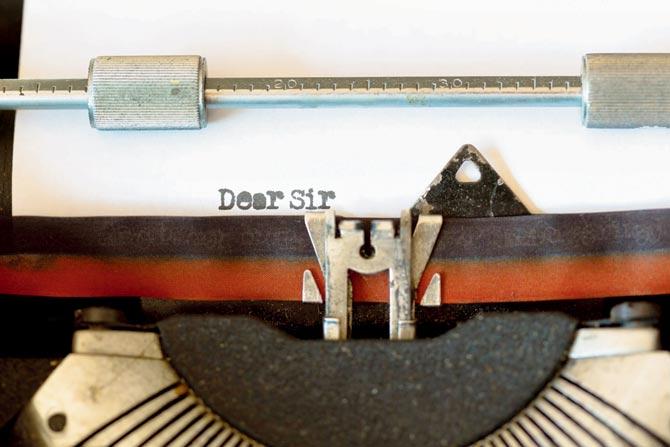Remember the days when letters used to begin with Dear? No? Actually neither do I.

 Remember the days when letters used to begin with Dear? No? Actually neither do I.
Remember the days when letters used to begin with Dear? No? Actually neither do I.
Nowadays, perfect strangers, usually 20 years younger than you, writing to you for a job or a request (yaniki demand) to do them a favour, begin with a jaunty Hey.
ADVERTISEMENT
One could argue that the use of Dear is no less peculiar. After all, it implies someone close to one’s heart. So, the fact that letters to strangers or professional acquaintances should begin with Dear is in itself an oddity, and one could rightly make the same objection to it as to the collegiate Hey. Both imply an acquaintance where there is none, basically. It’s just that one was sanctioned by Wren and Martin’s grammar book and the other, so far, isn’t.

In fact, we do feel that objection to it in other places that “Dear” makes an appearance, namely unsolicited correspondence from unknown men and women making amorous propositions via social media messengers. As in, ‘Hello dear, nice profile pic, very hot and sweet. Make me your friend.’ And if you reply with a variation of thanks but no thanks, promptly comes the reply — “Why dear, what happened. Answer me, no?”
The problem of Dear or not-Dear is partly a problem of balance, and partly a problem of formality’s bad reputation in the recent past. Formality is considered old fashioned, stiff and un-cool. Formality — coming from the word form — is something we use to negotiate various social relations until we arrive at a suitable individual equation over time. But it has also come to be seen as quaint at best, gauche at worst — something people mimic when they don’t really know the unspoken social codes — like Amitabh Bachchan talking English and walking English in
Namak Halal.
There’s a good reason for that. Formality reflects existing social equations. Older formalities often reflect a far more hierarchical and gendered society than the one we live in now. So, those who play out old formalities are not incorrectly seen as out of step with the times.
Social equations have indeed changed as some part of feudality shifts. In a way, informality is the new formality. But the difficulty with informality is that it too has to strike a balance — not assuming intimacies which do not exist because it crowds the person you are addressing.
To give a personal example, at a conference last week, a young man I’ve never met before came up to me and addressed me as Paro — something I hate strangers doing. While he did not think it rude to assume he can call me by a diminutive, had I said to him, “Please address me as Paromita” he would have undoubtedly thought me rude and arrogant. So I felt stuck and irritated — which did not make me very receptive to him.
Yet he may very well have thought, like all the cheery young things who begin their work emails to me with Hey, that he would sound dorky if he addressed me more formally. What is the way out of these apparently minor mismatches of formality and informality which lead to a larger feeling of annoyance, of feeling unheard, and disregarded or disrespected? How do we find a new form to mirror these new equations and address each other in a way which is friendly and equal, but respectful?
I vote for another old-fashioned thing, long fallen out of fashion — etiquette advice. A Ms or Mx Manner for some guidance on how to conduct ourselves in a new social world; with some suggestions for a charming, new, informal formality.
Paromita Vohra is an award-winning Mumbai-based filmmaker, writer and curator working with fiction and non-fiction. Reach her at www.parodevipictures.com
 Subscribe today by clicking the link and stay updated with the latest news!" Click here!
Subscribe today by clicking the link and stay updated with the latest news!" Click here!







